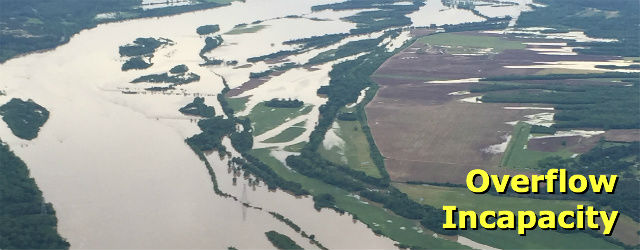Rains Push Arkansas River Traffic Down 61% In May, Down 18% Year-To-Date
by June 12, 2015 6:09 am 131 views

The swollen Arkansas River has forced Marty Shell to use his small trucking fleet to haul raw materials from Mississippi River ports to customers in the Fort Smith and Northwest Arkansas areas. He said the trucks are keeping the doors open for a Northwest Arkansas customer that employs around 600 people.
Unusually heavy rains during May forced the closure of many locks along the Arkansas River waterway from Tulsa down to where the waterway connects with the Mississippi. May tonnage on the river totaled 347,336 tons, down more than 61% compared to the 898,523 tons shipped in May 2014, according to figures from the U.S. Corps of Engineers.
“June tonnage will probably be the same, to be honest with you. We are in week five, and financially it hurts a lot,” said Shell, who owns Van Buren-based Five Rivers Distribution and operates the Port of Fort Smith and port operations in Van Buren.
Shell said barring more heavy rains it will likely be June 30 before barges can move again on the Arkansas River.
For the first five months of the year, Arkansas River tonnage has totaled 4.065 million tons, down 18% compared to the same period in 2014.
All major categories have double-digit percentage declines in the year-to-date comparison. Sand, gravel and rock shipments, often the largest tonnage category, is down 17% on the year with 1.035 million tons shipped January-May. The iron and steel category, a sign of construction and manufacturing activity, is down 15% with 601,725 tons shipped January-May.
Without gains in the remainder of the year, the river system could see two consecutive years of shipping declines. Tonnage totaled 11.719 million tons in 2014, down from the 12.139 million in 2013 but better than the 11.687 million in 2012 and the 10.6 million in 2011.
The Arkansas River system (The McClellan-Kerr Arkansas River Navigation System) is 445 miles long and stretches from the confluence of the Mississippi River to the Port of Catoosa near Tulsa, Okla. The controlled waterway has 18 locks and dams, with 13 in Arkansas and five in Oklahoma. The river also has five ports: Pine Bluff, Little Rock, Fort Smith, Muskogee, Okla., and the Tulsa Port of Catoosa in Oklahoma.
Shell said most of his customers try to keep 30 days of inventory on hand for such disruptions, but it will be “really, really close” if that strategy works for companies that depend on goods shipped via the river. One company in Northwest Arkansas is already using Shell’s trucks to haul in materials from other ports.
“We’re dead heading them (sending empty trucks) to Rosedale (Miss.) and to New Orleans and taking them up to Northwest Arkansas to keep those operations running, to keep more than 600 people from having to be out of work,” Shell said.
Shell said it’s been around 20 years since he’s seen river levels create this level of disruption. With that kind of time between events, Shell said people often take for granted the importance of river traffic on the economy.
“You might not live on the river and you might not work on the river, but in some shape, form or fashion, what happens on this river will impact you, directly or indirectly,” Shell said.
Delays and slow activity will be the norm for a few months even when water levels allow shipping to continue. A combination of a shortage of barges and high demand from companies who need to get materials in and out of Arkansas will create bottlenecks, Shell said.
“July and August will be tough. … We will see a backlog of barges and everyone will want everything at once,” he said.
However, he is optimistic about conditions returning to normal by September.
